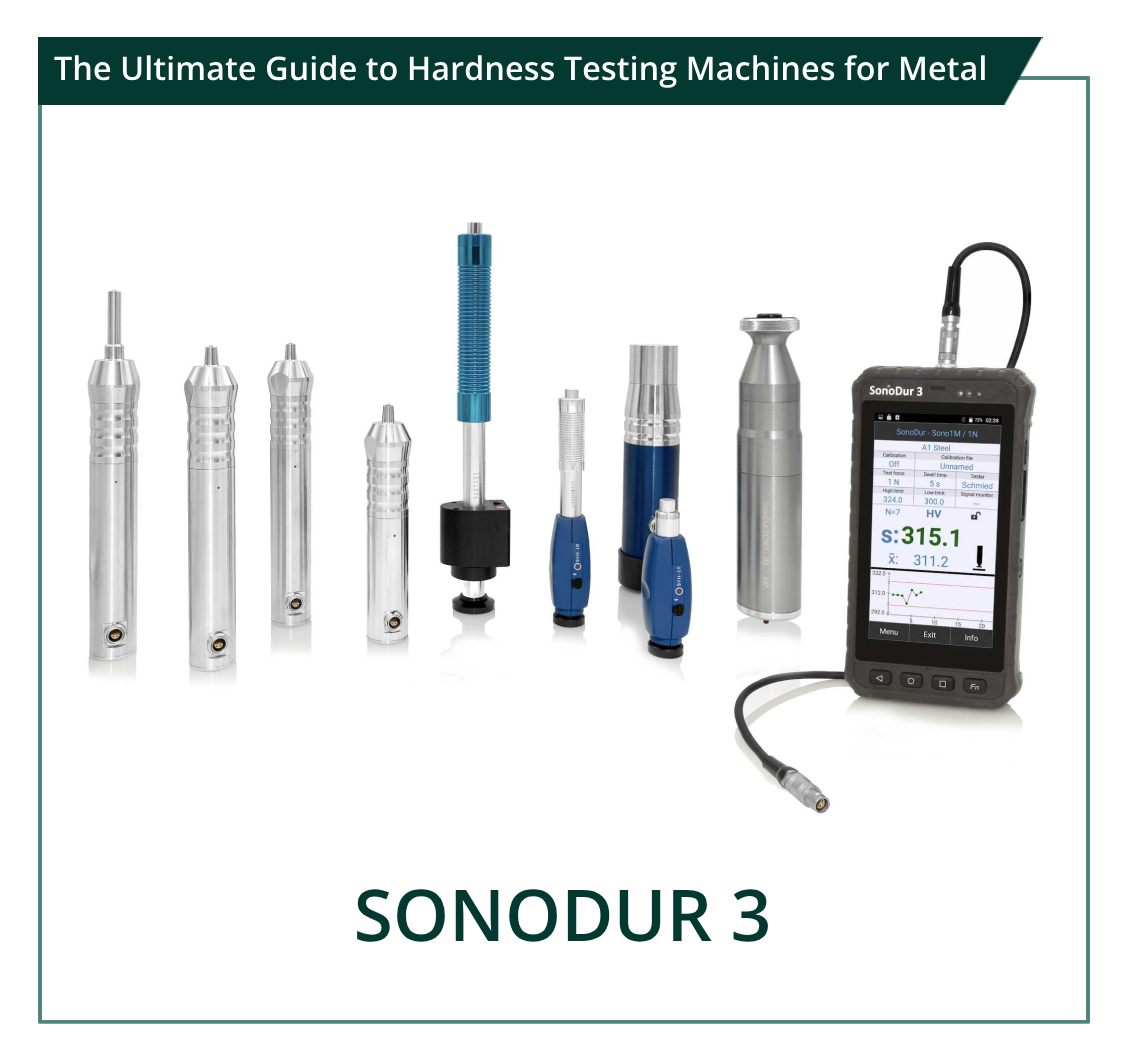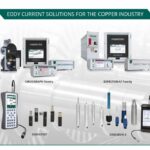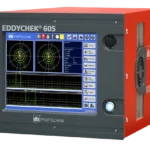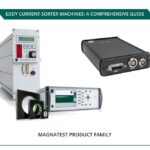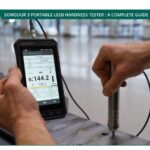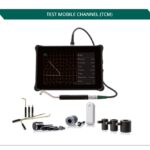In materials science and manufacturing, hardness testing machines for metal are crucial. They test the quality and durability of metal components. These devices are vital for testing metal hardness. It affects their performance, lifespan, and suitability for specific uses.
This blog will explore the importance of hardness testing machines. It will cover their methods and how the SONODUR 3 stands out.
Table of Contents
What Is a Hardness Testing Machine for Metal?
A hardness testing machine for metal measures the hardness of metals. It is an advanced instrument. Here, hardness means a material’s resistance to deformation. It refers mainly to permanent deformation, scratching, or indentation. This property is key to a metal’s ability to resist wear, pressure, and impact in use.
Hardness testing machines use different methods to assess this property. Each method has its own advantages, depending on the material and application. These methods include:
- Rockwell Hardness Test
- Vickers Hardness Test
- Knoop Hardness Test
- Brinell Hardness Test
- Leeb Rebound Hardness Test
- Ultrasonic Contact Impedance (UCI) Hardness Test
Each testing method provides unique insights into the material’s properties, making it essential for manufacturers, engineers, and quality control professionals to choose the right test for their specific needs.
Importance of Hardness Testing Machines in Metal Manufacturing
Hardness testing plays a vital role in metal manufacturing for several reasons:
1. Quality Control: Regular hardness testing ensures that metals meet the required specifications and standards. This is vital for ensuring the end products’ quality. It avoids defects that could harm performance and safety.
2. Material Selection: Knowing the hardness of different metals helps manufacturers. They can choose the best metal for a specific use. For instance, harder metals are often chosen for high-wear components.
3. Heat Treatment Validation: Hardness testing checks the success of heat treatments like annealing, quenching, and tempering. These treatments change the metal’s hardness. Testing ensures the desired hardness.
4. Failure Analysis: When metal parts fail, hardness testing can help. It can show if the material’s hardness contributed to the failure. This analysis helps in improving future designs and manufacturing processes.
5. Compliance with Standards: Many industries require adherence to specific hardness standards. Hardness testing ensures compliance with global standards. It’s vital for certification and market acceptance.
Methods of Hardness Testing
Hardness testing machines use different methods for metals. Each suits specific materials and testing needs. Here’s a closer look at some of the most commonly used methods:
Rockwell Hardness Test
The Rockwell hardness test is one of the most widely used methods due to its simplicity and speed. It involves pressing a hard steel or carbide cone into the metal’s surface under a specific load. The hardness value is determined by measuring the depth of the indentation. This method is great for testing metals of varying hardness.
Vickers Hardness Test
The Vickers hardness test uses a diamond pyramid indenter. It makes a small indentation on the metal’s surface. A microscope measures the indentation size. The hardness value is based on the load and the indentation area. This method is versatile and suitable for testing thin materials and small areas.
Knoop Hardness Test
The Knoop hardness test is like the Vickers test. It uses an elongated diamond indenter. This method is great for testing brittle materials and coatings. It minimizes the impact on the test area. It is often used in specialized applications where precise measurements are required.
Brinell Hardness Test
The Brinell hardness test involves pressing a hard ball into the metal’s surface with a specific load. The ball is made of steel or carbide. We measure the indentation’s diameter. Then, we calculate the hardness value using the applied load and the indentation area. This method is commonly used for testing materials with coarse or uneven structures.
Leeb Rebound Hardness Test
The Leeb test measures a metal’s hardness by its rebound velocity. It uses an impact body for the test. This method is portable. It suits testing large components and materials of varying hardness. It is particularly useful in field testing and for inspecting hard-to-reach areas.
Ultrasonic Contact Impedance (UCI) Hardness Test
The UCI hardness test uses an ultrasonic probe with a Vickers diamond indenter. The indentation dampens the probe’s oscillations. A frequency shift measures hardness. This method is non-destructive and ideal for testing small and delicate components.
Introducing the SONODUR 3: A Versatile Hardness Testing Machine for Metal
Among many hardness testers, the SONODUR 3 is the best. It has advanced features and is very versatile. This portable hardness tester uses two key technologies. They are Ultrasonic Contact Impedance (UCI) and Leeb rebound testing. Together, they provide a complete solution for testing metal hardness.
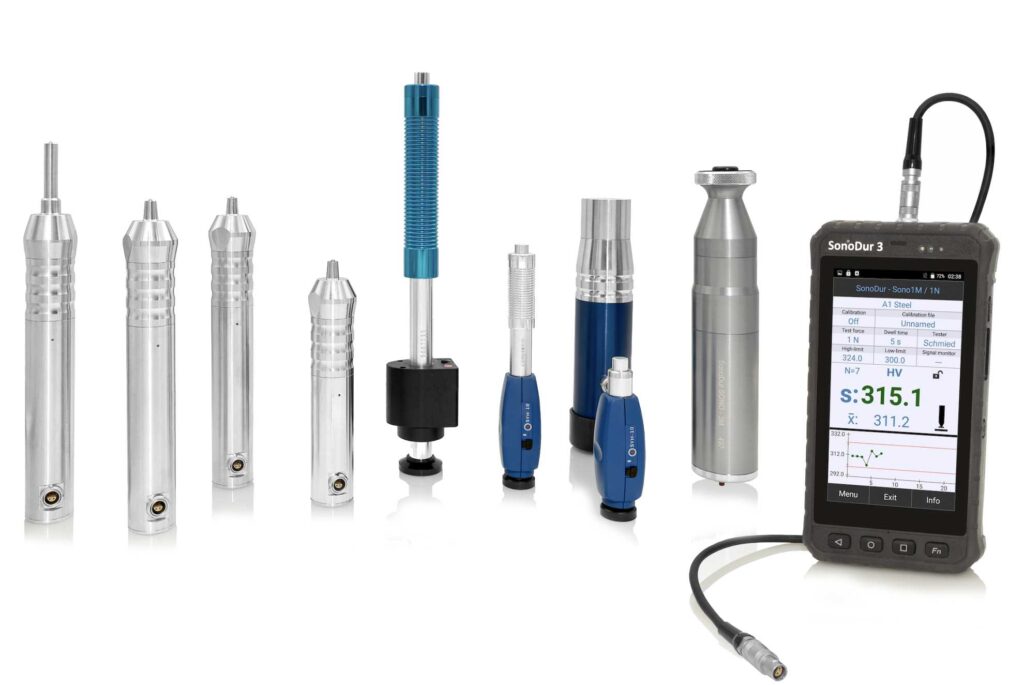
Key Features of the SONODUR 3
1. Dual Technology Integration: It offers both UCI and Leeb tests. Users can choose the best method for their needs. This dual capability enhances flexibility and accuracy in hardness testing.
2. Robust and Industrial-Grade Design: It is built for harsh environments. It has a rugged design with MIL-G810 and IP65 protection. This durability ensures reliable performance even in challenging conditions.
3. User-Friendly Interface: It runs on Android 7.0. It has a 5-inch, multi-touch display for a clear, intuitive experience. The device supports USB, Bluetooth, NFC, and WLAN. This allows easy data transfer and management.
4. Pre-Installed Material Library: It has a pre-installed library of materials. It includes steel, aluminum, and copper. This feature simplifies the adjustment process for different materials and ensures accurate results.
5. Versatile Applications: It excels in many uses. It is good for quality control, production processes, and mobile inspections. Its portability and ease of use make it perfect for on-site tests in confined spaces.
Advantages of Using the SONODUR 3
Maximum Flexibility: With the largest range of UCI test probes available, the SONODUR 3 offers unparalleled flexibility in testing different materials and components.
2-in-1 Concept: The integration of Leeb sensors via Bluetooth allows for simultaneous use with UCI probes, enhancing testing capabilities and efficiency.
Advanced Software Support: The device’s software provides clear graphical representations of test results, making it easy to detect irregularities and make informed decisions.
Applications of Hardness Testing Machines
Hardness testing machines, including the SONODUR 3, are used in a wide range of applications across various industries:
Manufacturing and Quality Control
In manufacturing, hardness testing machines are crucial for ensuring that metal components meet quality standards. Regular testing during production helps identify any deviations from specifications and allows for timely adjustments to maintain product quality.
Automotive Industry
The automotive industry relies on hardness testing to ensure the durability and safety of components such as engine parts, transmission systems, and suspension components. Hardness testing helps in selecting materials that can withstand high stress and harsh operating conditions.
Aerospace Industry
In the aerospace industry, hardness testing is essential for verifying the performance and reliability of critical components like turbine blades, landing gear, and structural elements. The rigorous testing standards ensure that components can endure extreme conditions during flight.
Construction and Heavy Machinery
For construction equipment and heavy machinery, hardness testing is used to evaluate the strength and wear resistance of components such as gears, shafts, and structural elements. Ensuring the hardness of these parts is crucial for their longevity and performance in demanding environments.
Research and Development
In research and development, hardness testing machines are used to study new materials and evaluate their properties. This testing is vital for developing innovative materials and technologies with improved performance and durability.
Choosing the Right Hardness Testing Machine
Selecting the right hardness testing machine depends on several factors, including:
Material Type: Different testing methods are suited for various materials, so it’s important to choose a machine that can accurately test the specific type of metal you are working with.
Testing Method: Consider the testing methods that best meet your needs. For instance, if you require a portable solution for field testing, a device with Leeb rebound testing capability may be ideal.
Precision and Accuracy: Ensure that the machine provides accurate and consistent results. Look for features such as advanced software support and high-quality probes that enhance measurement precision.
Ease of Use: A user-friendly interface and clear display can make a significant difference in the efficiency and effectiveness of hardness testing. Choose a machine that offers an intuitive experience and easy data management.
Conclusion
A hardness testing machine for metal is essential. It ensures the quality and performance of metallic parts. You can improve quality control by knowing the testing methods. Then, use a reliable machine like the SONODUR 3. This will help with material selection and ensure compliance with industry standards.
If you work in manufacturing, automotive, aerospace, construction, or research, buy a good hardness tester. It will give you insights into your materials and help you get the best results. The SONODUR 3 is the solution for all your hardness testing needs. It has advanced features, dual technology integration, and a robust design.
For more on hardness testing machines and the SONODUR 3, visit FOERSTER India’s website. You can also contact their experts for help.
Frequently Asked Questions
What is a hardness testing machine for metal?
A hardness testing machine for metal is an instrument used to measure the hardness of metallic materials. Hardness in this context refers to the resistance of the metal to deformation, scratching, or indentation.
What is the purpose of a Leeb rebound hardness test?
The Leeb rebound hardness test measures the rebound velocity of an impact body to determine the hardness of the metal. It is portable and suitable for testing large components and materials in the field.
How do ultrasonic contact impedance (UCI) hardness testers work?
UCI hardness testers use an ultrasonic probe with a diamond indenter. The probe’s oscillations are dampened by the indentation, and the frequency shift is used to calculate the hardness value, making it ideal for small or delicate components.
Why is hardness testing important in manufacturing?
Hardness testing in manufacturing is crucial for ensuring that metals meet quality standards, selecting appropriate materials, validating heat treatments, analyzing failures, and complying with industry regulations.
How does the SONODUR 3 hardness testing machine stand out?
The SONODUR 3 stands out due to its dual technology integration (UCI and Leeb testing), robust design, user-friendly interface, pre-installed material library, and versatile applications, making it ideal for various hardness testing needs.
What are the applications of hardness testing machines in different industries?
Hardness testing machines are used in diverse industries including manufacturing, automotive, aerospace, construction, and research. They help ensure component durability, material selection, quality control, and compliance with industry standards.



